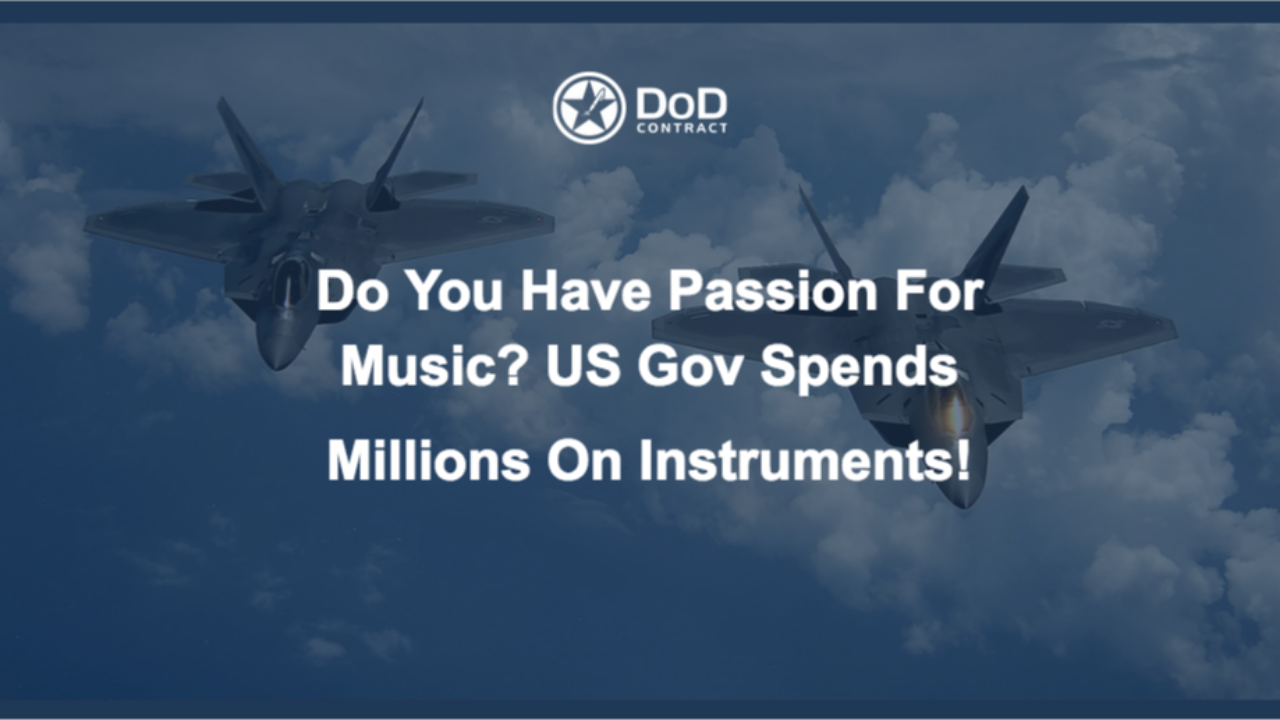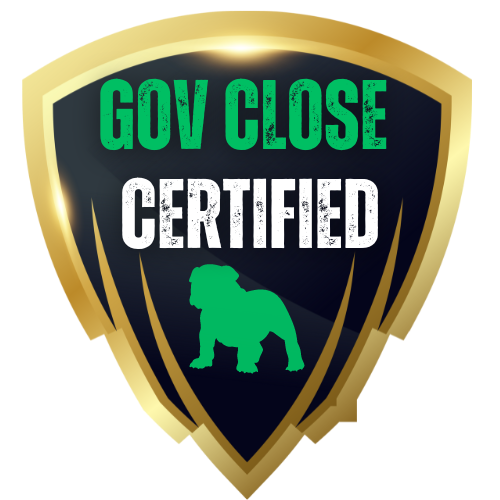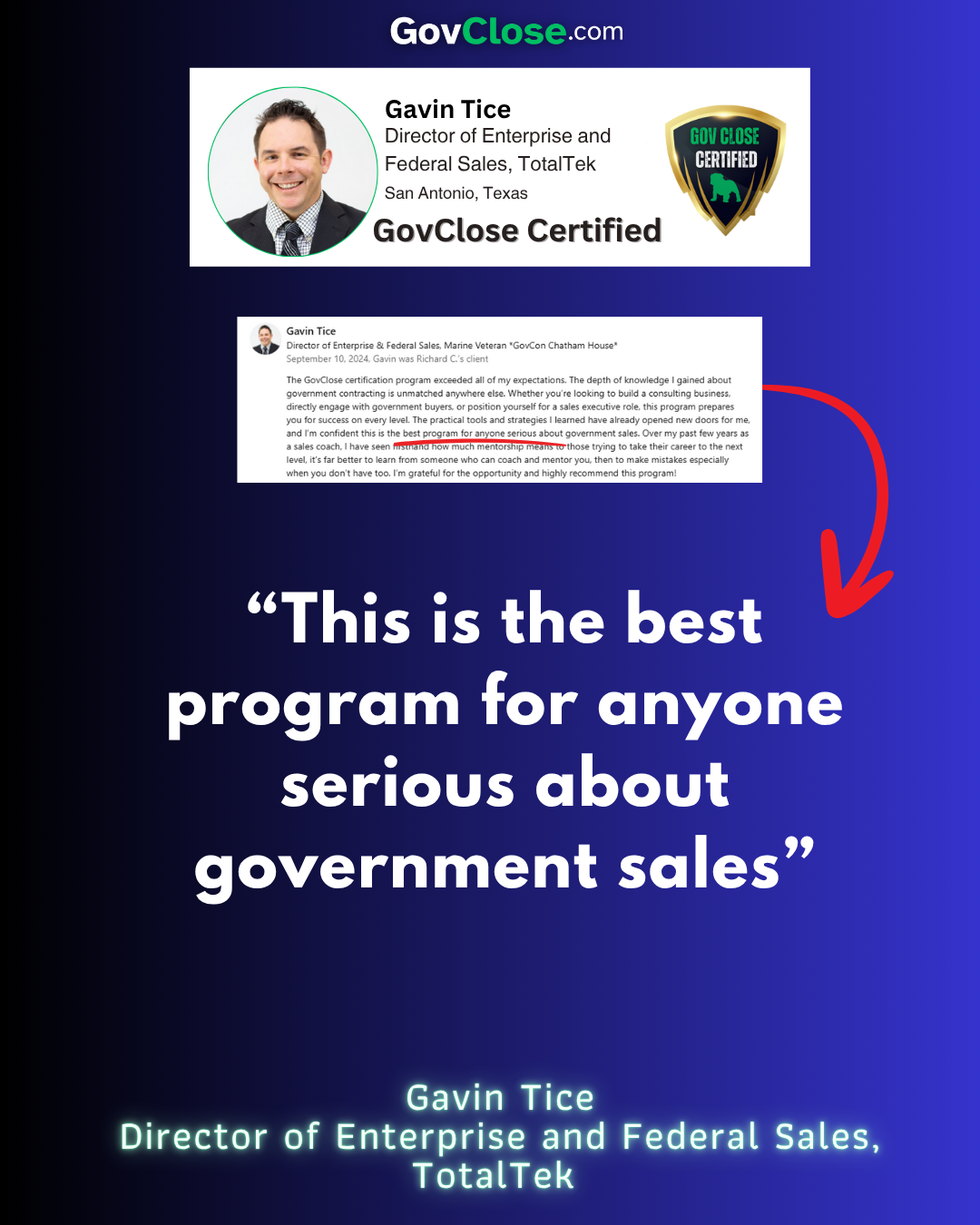
Do You Have A Passion For Music? The US Gov Spends Millions On Instruments! (Podcast Transcript)
Jan 06, 2023[00:10] Richard C. Howard: Hey, guys, Ricky here with the DoD Contract Academy podcast, Dodcontract.com. And today we are going to talk about why I don't worry personally about my sales to the federal government and how I manage my pipeline. And that's really the reason that I don't worry about that. I know that the sales are going to come in. I know that the contracts are going to come in because I'm managing my personal pipeline exactly the same way that I have been talking about on this podcast and that I've talked to the successful businesses that are selling to the government. So remember, this is not the easy way of selling. Selling to the government is not winning a lottery ticket. It's not going to be easier than selling commercially. It can be, in some cases, a lot more financially rewarding, and it can produce stable contracts and it's certainly a different line of revenue. But selling to the government is absolutely the marathon. This is the long game, and we have to make sure that we have discipline and that we are consistently engaging with the government.
Now, it's not hard once you understand the process, but it does require consistent engagement. It's just like running. I mean, if you're running long distances every day and you have in your mind, hey, I'm going out to run a marathon or I'm going to run eight or 9 miles today, you're not sprinting the hallway, whatever pace that you can handle, that's what you're doing. So this is consistent engagement on a daily basis, and I'm going to talk a little bit about that now. So if you heard some of the prior podcasts where I've gone into how you build your pipeline, how you target your customers, you know, I'm a big fan of only having a couple of agencies that you're targeting for sales, especially in the beginning, and you're doing your research to see who buys what you sell.
And by the way, we teach all of [email protected] if you want to see the defense sales formula and get more information on that. And by the way, that's a free workshop that you can have access to. Just go to the website Dodcontract.com and they'll go into much more detail. But initially I usually say, hey, let's find three to five opportunities with each agency. And I talk about working those. Now, you are working those consistently over time. And those opportunities, some of them are going to work out, some of them aren't. But a lot of those are going to turn into other opportunities that you weren't even thinking about. So those are going to blossom.
So right now I'm managing with three target customers about 40 opportunities, we'll call them, right? And those opportunities are in different stages. So first step one, you got to have a CRM system, okay? You can use a spreadsheet when you're just getting started, but eventually that three to four opportunities with each target customer that's going to turn into the 40 like I'm managing now. So you need to have something that you can track all of that in. Because I'm telling you, what's going to happen is you're going to find an opportunity, you're going to talk to a lot of different people and something that you find this week that's going to disappear and get lost as you are making your way maybe through opportunities that have a little bit more credibility or higher confidence in.
And we'll talk about that in a second. So first you got to have a management tool. So some people use salesforce. I've used a lot of different ways of managing the federal opportunities because I'm not sure that I found a perfect CRM for federal opportunities. So whether it's salesforce or you're using something like Asana or maybe you've taken something that exists and made it your own, pick something and stick with it probably for six months just to get used to it and see, hey, maybe you want to pivot to something else afterwards. But don't worry so much about the CRM tool, just track the opportunities. I'm using a CRM and I am in that thing every day and I don't spend a ton of time in it, but I have to look through the opportunities and know because they're going to jog your memory. What are the next steps? And by the way, some of these systems are better than others. Some of them track your emails, some of them will send you reminders. And that's great, especially as your opportunity list builds up.
So I'm looking at my notes here because I want to talk a little bit about how you're going to take these opportunities and build confidence or score them right. So there's lots of different ways to do this. Some people have a very intricate kind of one through ten processes, meaning one is maybe a basic lead and ten is like super high confidence. I don't think you have to get I think ten steps is too much. But you've got to have a way of scoring these and here's why. And basically I'm going to recommend now that you go with a high, medium and low confidence and then just classify other opportunities as just leads. So let's talk about that. So just leads, right? Because part of what you're doing every day, or at least every week, is prospecting. You probably have an auto. We recommend that you set up an auto search for different RFI sources, saw things coming out. But if it's just something you read about, you found an RFI, you found a contract that's expiring next year and you think it's a good fit for your business, all it is, is a lead. It could be perfect for your business, but it's nothing.
It's nothing unless you're engaging on it, right? So by all means you got to start somewhere and I do this too. So you're going to find these leads, these opportunities, whether it's going to like the SBIR website and finding an SBIR topic that you're a good fit for, or like I said, maybe you get an email from your automated Federal Opportunity Search and it's an RFI for something that's great for you. Awesome. That's a lead. Okay, so that's kind of at the bottom, right? Track that and you're going to have a date. Hey, it's due on this date. I got X number of steps to work on to get there. Those are your leads.
The next thing is once you've engaged on those now, that becomes a higher level of an opportunity, right? So if I've submitted an RFI, well, now that's at least a one for me, right? Because I've submitted something. Now that office has to know who I am. I've confirmed that they received the request for information submission that I wrote, and now I'm going to be looking for a meeting, right? So now I want to have that meeting. I'm looking to schedule a meeting with them. And so this is something that is on my radar. And if it's an RFI submission, this is something that's potentially coming up. So I'm going to spend more of my time looking at those opportunities that are ones than I am with the leads because there's more. I would say the odds of me winning something now have increased. They know who I am. I'm requesting meetings now. Once I've talked to them, we'll talk to the RFI submission. Once I've talked to them, once I got the meeting, whether it's in person or virtual, and we were able to go through our slide deck and show how we're a good fit for them.
Now I'm moving that up to number two right now. I've actually had a conversation with them. So you could call that medium confidence, right? So at least at this point, maybe they haven't said, hey, you're the solution we want to go with, but maybe you understand the opportunity a little bit more. You've now confirmed that it is a good fit for you, and so you're not dismissing it, that you may have the conversation with them like, hey, this isn't right. They may give you something else, but if it's not right, get rid of it. Focus on the next thing. And of course, ask them, hey, is there something coming up that is right for us? Do you know somebody that we can talk to? I use these RFI submissions to get meetings and to learn about other opportunities too. So even if it's not a perfect fit, this could be a good way to go forward. So anyway, you have now this number two related or number two on your score, your medium confidence opportunity.
So in your CRM and you're paying attention to this a little bit more, you've now confirmed with them. They have your response. You've had a conversation. It is a good fit. They're not saying you're the winner. They want you necessarily or you have to be the one to get in there, but maybe you understand it a little bit more. You know when the solicitation is going to come out. You've had a meeting with the program manager or the contracting officer. So now you've got a two. From here I would go to three or High Confidence. So for me a high confidence is I think this thing is going to close and it's probably going to close in the next 90 days or so. Again, it doesn't have to be the next 90 days, but for me, high confidence is the office that I'm working with, the federal government office, wants to put us on contract. Now this could be because maybe we're working in a way for them to Sole Source to us, maybe there's going to be a solicitation is still coming out, but they have said we want to put you on contract, we want you to bid on this.
If I get that or maybe the government office calls me and says, hey, we want to put you on contract, whatever it is, whatever indication they give that they want to put you on contract, that's high confidence. You are now absolutely the most focused on these opportunities. So when I go into the system each day, first and foremost I'm looking at, okay, what my high confidence opportunities? Anything that's going to close in the next 30, 60, 90 days, I am absolutely paying attention to that. And so that doesn't mean I'm emailing them every day. You don't want to do that, but you may have to email the program manager. Maybe there's a discussion that needs to happen there or maybe you're working with another business that you have to partner with to go in on this. So you want to make sure that you are preparing for that. There could be a timeline. If you have to write a proposal, make sure you guys are, you and your team are writing their proposal and proposal and you have enough time to do that. So I'm making sure that all of the little things that need to happen in order to win that opportunity are now happening. And then as you get closer and closer, those high level of confidence things could be.
Now you're just working with a contracting office to make sure that everything goes through on there. And so you get awarded, right? So it may not be a question of competing with another business or putting a proposal in. Now it's just going through the government machine to get your funding. So whether that's through GSA or another contract vehicle, Sole Source Award, there's a lot of different steps there and each one is a little different. I'm not going to get into that. But you see my point though. So when I go in there, that's reminding me, and I'm updating it every day so I don't forget anything. So a lot of times, some of these can be simple and some of these can be complex. So there might be four or five different moving parts with each opportunity, and especially if there are time constraints, you want to make sure you're focused on that, and then I just move down the list. Right? And so I have some things that are eight months out, nine months out, a year and a half out. So I am not engaging on those every day, but they're right in front of me all the time, so I know, hey, I've got a meeting that I've got set up for three months from now, or I have a meeting two months from now that I've already set up. Just tracking those, making sure that you're doing the things that you need to in order to close.
So that's why I don't worry about it, because I'm constantly working at it. It's the same thing with just about everything that I've ever done. Public speaking is a good example. I don't worry about public speaking because if I have to give a speech, I practice that thing AG nauseum, until I get onto the stage or I've done it so many times that I know the material clearly, and so when I get up there, I don't have to even think about it. I know what I'm going to say. I've practiced it 100 times. Selling, for me is the same thing. You're constantly engaged, and that could just be an hour a day, it could be 8 hours a day. It depends on what your role is. But that is going to produce confidence, it's going to produce results, and it's going to keep you engaged. So hopefully that helps you guys out, learn a little bit about how I conduct my sales, my pipeline with the federal government, and you can take that or leave it. We are doing amazing things here at the podcast. We keep going up in the rankings.
We have a couple of excellent [email protected]. So whether it is joining the academy, where we help you on a monthly basis with training, with coaching, with taking a look at your opportunities, we help you through that. We also have a more intensive program at DoD Contract Academy, where if you haven't started your business or you just want to get in and work directly with me and the team, we have a five week launch program that is doing really well and would love to see you in there. You have to apply for that one. It's a little bit more intensive, but we're seeing results, and we want you to see results so head on over to Dodcontract.com. Don't forget to subscribe to the podcast. Please leave a review. That means a lot. Share this with people, get the word out there, and I will see you next time.
If you enjoyed this episode, you can also check out SBIR, Finding your Niche and Getting Your Foot in the Door where I discussed the upcoming round of SBIR openings, using SBIR and STTR topics to help find your niche and shamelessly plug DoD Contract Academy!
Turn Government Contracting Knowledge Into Income
This isn’t a course. It’s a certification and implementation system to help you build a consulting business, land a high-paying sales role, or scale your own company in federal contracting.
We hate SPAM. We will never sell your information, for any reason.


